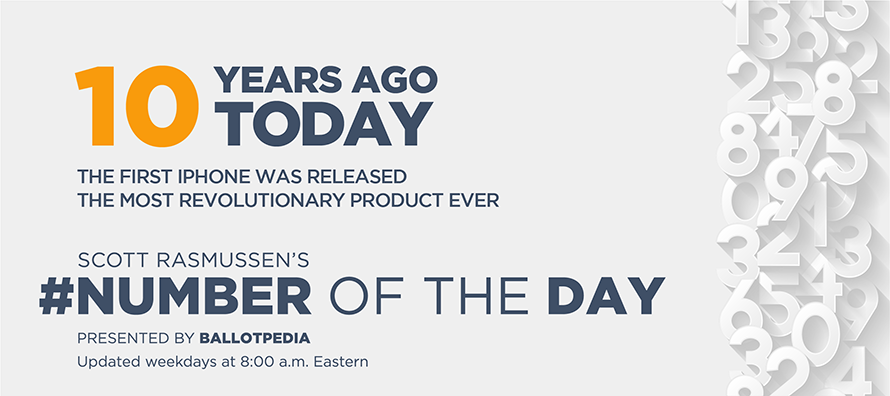Scott Rasmussen's Number of the Day for June 29, 2017

The Number of the Day columns published on Ballotpedia reflect the views of the author.
June 29, 2017: Societal changes take place so slowly that we rarely see them unfold on a day-to-day basis. Our culture and lifestyles adapt so quickly to new technology that we soon can’t remember life without the latest innovation. But when we look back over any significant period of time, the scale of change is truly breathtaking.
Today, smartphones are such a big part of our culture that it’s hard to believe they’ve only been around for a decade. But the smartphone era began 10 years ago today with the June 29, 2007, release of the iPhone. Time magazine hailed it as the 2007 Invention of the Year, and it took just nine years to sell the first billion iPhones.[1]
Every American with a smartphone today has access to more information than the president of the United States could command just a generation or two ago. As I note in Politics Has Failed: America Will Not, the wide distribution of information is leveling the playing field and chipping away at the information advantage enjoyed by the elites.
| Every American with a smartphone today has access to more information than the president of the United States could command just a generation or two ago. |
“The devices and connectivity so essential to modern life put unprecedented power in the hands of every individual,” says Harvard’s Nicco Mele. This is “a radical redistribution of power that our traditional institutions don’t and perhaps can’t understand.” As if that wasn’t enough, he adds, “Radical connectivity is toxic to traditional power structures.”
Economist Mark Perry says the iPhone is “perhaps the most remarkable and revolutionary consumer product ever introduced.”[2] To support that claim, Perry cites a 2014 article with a telling headline: “Everything from 1991 Radio Shack Ad I Now Do with my Phone.”[3]
Radio Shack billed itself in those days as America’s Technology Store. Perry notes that the equivalent of 14 items in the 1991 ad are now available in a smartphone: personal stereo, AM/FM clock radio, headphones, calculator, computer, VHS camcorder, mobile phone, regular speed dial phone, portable CD player, mobile CB radio, desktop scanner, phone answering machine, cassette tape recorder, and radar detector.
Adjusting for inflation, those 14 items would together cost $5,614 today. But instead, you can get it all on an iPhone for under $500. Or, you can pay around $30 a month to enjoy the benefits of this amazing breakthrough.
Plus, as a bonus, the iPhone can do all kinds of things that weren’t possible or even dreamed of in 1991. Perry observes that his includes “GPS, text messaging, email, Internet access, mobile access to movies, music streaming, more than two million mobile apps, iCloud access” and more.
On top of those new services, the iPhone provides other services available in 1991 that were not listed in the Radio Shack ad. That list includes a “camera, stopwatch, timer, photo-editing, travel books, encyclopedia, newspaper subscriptions, dictionary, language translator,” and more.
What a bargain! And what unbelievable progress.
As noted in my book, the hundreds of millions of smartphones owned by Americans also reflect the greatest force for change in history.
While the world has been transformed by the iPhone in just a decade, the product was in development for a long time before that. Apple signed up for the domain name iPhone.org way back on December 14, 1999.[4]
Each weekday, Scott Rasmussen’s Number of the Day explores interesting and newsworthy topics at the intersection of culture, politics, and technology.
- June 28, 2017 – 59 percent of liberals would participate in civil protest—up from 41 percent before Trump was elected
- June 27, 2017 – 32,242,443 public interactions with police could be eliminated by self-driving cars
- June 26, 2017 – 72 percent of Americans have fired a gun
- June 23, 2017 – 13 states impose a sales tax on food
- June 22, 2017 – 19 Democratic senators running for re-election in states with Pivot Counties
- To see other recent numbers, check out the archive.
Scott Rasmussen’s Number of the Day is published by Ballotpedia weekdays at 8:00 a.m. Eastern. Click here to check out the latest update.
The Number of the Day is broadcast on local stations across the country. An archive of these broadcasts can be found here.
Columns published on Ballotpedia reflect the views of the author.
Ballotpedia is the nonprofit, nonpartisan Encyclopedia of American Politics.
See also
Footnotes
- ↑ Time, "Invention Of the Year: The iPhone," November 1, 2007
- ↑ AEI Ideas, "Happy 10th birthday, iPhone — perhaps the most remarkable and revolutionary consumer product ever introduced," June 25, 2017
- ↑ Trending Buffalo, "Everything from 1991 Radio Shack ad I now do with my phone," January 14, 2014
- ↑ Fierce Wireless, "Timeline of Apple 'iPhone' Rumors (1999-Present)," December 18, 2006
| |||||||||||||||||||||||


